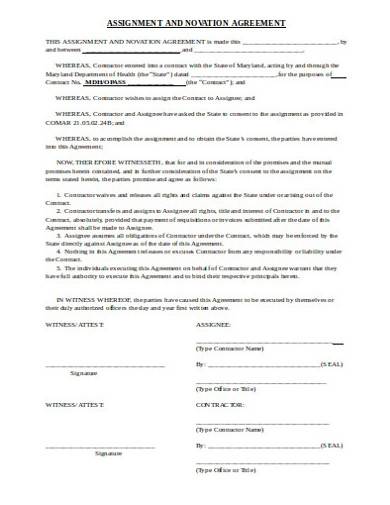
Oct 28, · The biggest difference between novation vs. assignment has to do with liability. With novation, both benefits and liabilities are transferred to a new party. With assignment, the original party may still retain liability even though they no longer receive any benefits from the blogger.comted Reading Time: 5 mins An assignment agreement transfers one party's rights and obligations under a contract to another party. The party transferring their rights and duties is the assignor; the party receiving them is the assignee. Novation is a mechanism where one party transfers all its obligations and rights under a contract to a third party, with the consent of the original blogger.comted Reading Time: 5 mins Nov 12, · Novation. Assignment. Transfer of rights. The English Technology and Construction Court has found that the assignment of a sub-contract from a main contractor to an employer upon termination of an EPC contract will, in the absence of express intention to the contrary, transfer both accrued and future contractual blogger.comted Reading Time: 9 mins
Assignment vs Novation: Everything You Need to Know
The biggest difference between novation vs. assignment has to do with liability. With novation, assignment and novation, both benefits and liabilities are transferred to a new party. With assignment, the original party may still retain liability even though they no longer receive any benefits from the contract. When one person transfers a benefit or an interest to another person, this is known as assignment.
The person doing the assigning retains the burden outlined under the original contract. This means if the assignee does not hold their responsibilities, the assignor may be liable.
To protect themselves from liability, many assignors request that the assignee provide an indemnity. When an assignment takes place, assignment and novation, you are giving a third party some rights to a contract while retaining the contractual obligations. Assignments are common for large businesses that own and operate subsidiary businesses. For example, you may want the parent company to handle all contractual obligations but have payments made to the subsidiary company.
A deed of assignment would be used to achieve this goal. It's important to understand that assignments do not invalidate the original contract, and they also do not create new agreements.
In some cases, an assignment can be made without obtaining approval from all parties named in the original contract. Usually, providing notification to the other party is enough to allow the assignment to move forward. Once an assignment has taken place, the incoming party will receive benefits from the original contract and will be able to make sure their rights are enforced by bringing a lawsuit against the assignor.
It is impossible to assign obligations, meaning the original party will assignment and novation be responsible for upholding their responsibilities to the other party.
In most cases, the assignee will assume responsibility for performing the contract, and the assignor will be indemnified against breaches of contract. However, the assignor is still responsible for any breaches or performance failures that occur before assignment has taken place.
Assignments are very common in construction contracts, particularly in relation to collateral warranties. For example, the person funding the construction project may want the developer to make an assignment to any designers or contractors that will work on the project. This ensures that the funder will benefit from the project and assignment and novation also be protected should the project fail to be completed.
In some situations, contracts will expressly prevent assignment or will include certain qualifications that must be met before assignment can occur. For example, the contract may require that both parties consent to assignment. When there is an agreement between three parties to transfer contract rights from an original party to a new party, this is known as novation. During novation, contractual responsibilities and rights will be transferred to a third party.
This differs from assignment, assignment and novation, where only rights are transferred. Novation commonly assignment and novation when a business is sold or during a corporate assignment and novation. When a corporate takeover occurs, novation can allow contracts to be transferred from one company to another. This allows the company performing the takeover to continue the operations of the company that has been purchased. You must use novation if your goal is to transfer the responsibilities of a contract in addition to the benefits, assignment and novation.
While some people try to claim novation when facing liability, assignment and novation, establishing this transfer is very difficult. When novation occurs, the original contract is terminated, and a new contract takes its place. In this new contract, the third party will assume the same obligations as the parties listed in the initial contract.
Neither past burdens or rights listed in the original contract are canceled by novation. The new contract must include consideration. This means the new party must pay a price for being novated into the new contract. All three parties have the ability to avoid consideration by documenting the novation in a signed deed, assignment and novation.
If you need help understanding novation vs. assignment, you can post your legal needs on UpCounsel's marketplace. UpCounsel accepts only the top 5 percent of lawyers to its site. Lawyers on UpCounsel come from law schools such as Harvard Law and Yale Law and average 14 years of legal experience, including work with or on behalf of companies like Google, Menlo Ventures, and Airbnb.
What is NOVATION? What does NOVATION mean? NOVATION meaning, definition \u0026 explanation
, time: 4:13Assignment and Novation: Spot the Difference - WFW

Oct 28, · The biggest difference between novation vs. assignment has to do with liability. With novation, both benefits and liabilities are transferred to a new party. With assignment, the original party may still retain liability even though they no longer receive any benefits from the blogger.comted Reading Time: 5 mins An assignment agreement transfers one party's rights and obligations under a contract to another party. The party transferring their rights and duties is the assignor; the party receiving them is the assignee. Novation is a mechanism where one party transfers all its obligations and rights under a contract to a third party, with the consent of the original blogger.comted Reading Time: 5 mins Nov 12, · Novation. Assignment. Transfer of rights. The English Technology and Construction Court has found that the assignment of a sub-contract from a main contractor to an employer upon termination of an EPC contract will, in the absence of express intention to the contrary, transfer both accrued and future contractual blogger.comted Reading Time: 9 mins
No comments:
Post a Comment